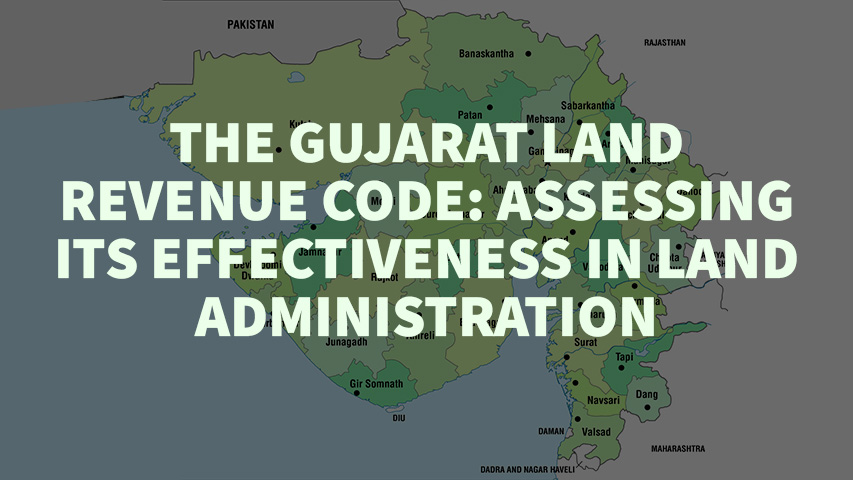
The Gujarat Land Revenue Code: Assessing its Effectiveness in Land Administration
The Gujarat Land Revenue Code (GLRC), enacted in 1959, serves as a comprehensive legislation governing land administration in the Indian state of Gujarat. With an aim to streamline land-related matters and provide efficient services to landholders, the GLRC has played a vital role in shaping land administration practices in the state. In this article, we will assess the effectiveness of the GLRC by analyzing its key provisions, relevant case laws, and associated acts.
Contents
The Gujarat Land Revenue Code (GLRC), enacted in 1959, serves as a comprehensive legislation governing land administration in the Indian state of Gujarat. With an aim to streamline land-related matters and provide efficient services to landholders, the GLRC has played a vital role in shaping land administration practices in the state. In this article, we will assess the effectiveness of the GLRC by analyzing its key provisions, relevant case laws, and associated acts.
Contents
1. GLRC and Land Administration
2. Important Provisions of the Gujarat Land Revenue Code
3. Related Case Laws
4. Acts Related to the Gujarat Land Revenue Code
5. Winding Up Note
2. Important Provisions of the Gujarat Land Revenue Code
3. Related Case Laws
4. Acts Related to the Gujarat Land Revenue Code
5. Winding Up Note
GLRC and Land Administration
The Gujarat Land Revenue Code plays a significant role in land administration in the state. It establishes a robust framework for assessing and managing land revenue. It guarantees a more transparent and effective approach by streamlining the procedures. It is important to perform regular evaluations to find any gaps or potential improvement areas. This would enable better land administration and ensure efficient use of land resources in Gujarat.
Important Provisions of the Gujarat Land Revenue Code
The Gujarat Land Revenue Code plays a significant role in land administration in the state. It establishes a robust framework for assessing and managing land revenue. It guarantees a more transparent and effective approach by streamlining the procedures. It is important to perform regular evaluations to find any gaps or potential improvement areas. This would enable better land administration and ensure efficient use of land resources in Gujarat.
Important Provisions of the Gujarat Land Revenue Code
Classification of Land
According to the use of land, the GLRC divides land into several categories. It includes agricultural, non-agricultural, wasteland, and forest land. It helps to acknowledge on the rights and duties connected to each type of land.
Ownership and Transfer of Land
The GLRC establishes a systematic process for documenting ownership and transfer of land. It mandates the maintenance of land records, registration of transactions, and issuance of appropriate documents to recognize ownership rights. This provision aims to ensure the transparency and legality of land transactions.
Settlement of Land Revenue
The GLRC outlines the mechanism for assessing and collecting land revenue. It establishes the procedure for the settlement of land revenue, including the preparation of a record of rights, determination of land revenue rates, and collection of revenue by the revenue authorities. This provision enables the state government to collect land revenue efficiently.
Tenancy and Land Reforms
The GLRC addresses the rights and liabilities of tenants and the provisions related to land reforms. It protects the interests of tenants by regulating rental agreements, determining fair rent, and providing safeguards against eviction. Additionally, it empowers the government to undertake land redistribution and consolidate fragmented holdings to promote agricultural productivity.
Dispute Resolution
The GLRC incorporates provisions for resolving disputes related to land administration. It establishes revenue courts and empowers revenue officers to adjudicate cases concerning land disputes. This provision helps in expeditiously resolve conflicts and ensure access to justice.
Related Case Laws
Vasanbhai Khimjibhai v. Vadilal Lallubhai
In this case, the Gujarat High Court ruled that as per the interpretation of the GLRC, the revenue authority does not have the power to reconsider or revise a decision on the ground of a mistake, except in limited circumstances. It emphasized the importance of maintaining the finality of decisions taken by revenue authorities while administering land matters.
Mahadeo Govindbhai Bhuva v. State of Gujarat
This case highlighted the significance of proper documentation of land transactions under the GLRC. The court held that failure to register a document regarding the transfer of land does not affect the validity of the transaction, but it has implications in terms of admissibility and enforceability of the document as evidence.
Sunderabhai Kanubhai v. State of Gujarat
In this case, the court outlined that the payment of land revenue should be made before challenging any revenue demand. It underlined that non-payment of revenue could act as a bar to the maintainability of an appeal against revenue demands.
Acts Related to the Gujarat Land Revenue Code
The Gujarat Land Acquisition Act, 2013
This act complements the GLRC by providing provisions for the acquisition of land by the state government for public purposes. It lays down the procedures for land acquisition, determination of compensation, and rehabilitation and resettlement of affected persons.
The Gujarat Tenancy and Agricultural Lands Act, 1948
This act complements the GLRC by delineating the rights and obligations of tenants and landowners. It safeguards tenant rights, regulates rent, and provides conditions for the conversion of agricultural land to non-agricultural use.
Winding Up Note
The Gujarat Land Revenue Code has been instrumental in establishing a robust land administration system in the state of Gujarat. Its provisions regarding land classification, ownership, transfer, revenue settlement, tenancy, and dispute resolution have effectively facilitated the governance and management of land resources. Through notable case laws and associated acts, the GLRC has continued to adapt to the evolving needs of land administration, ensuring transparency, fairness, and efficiency.
